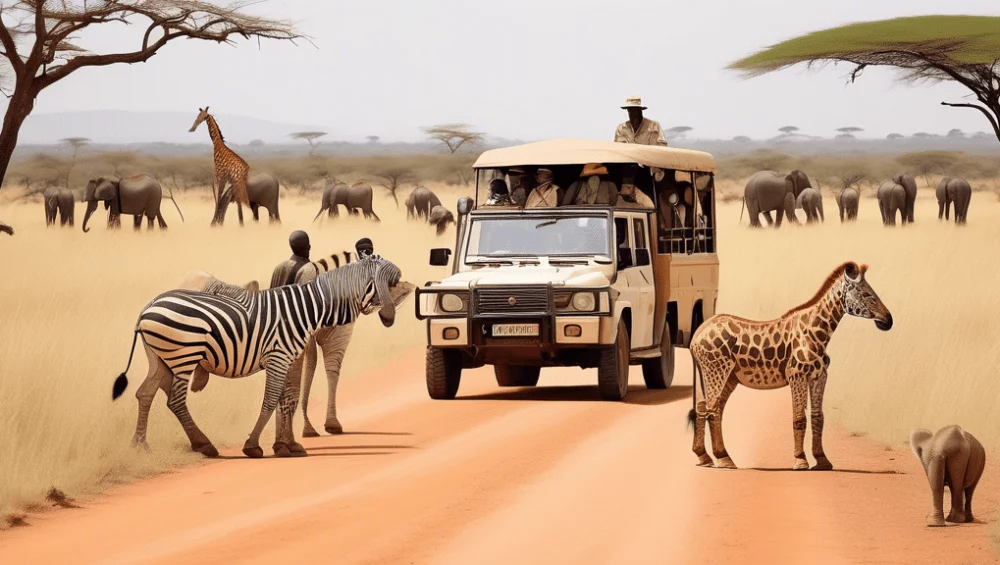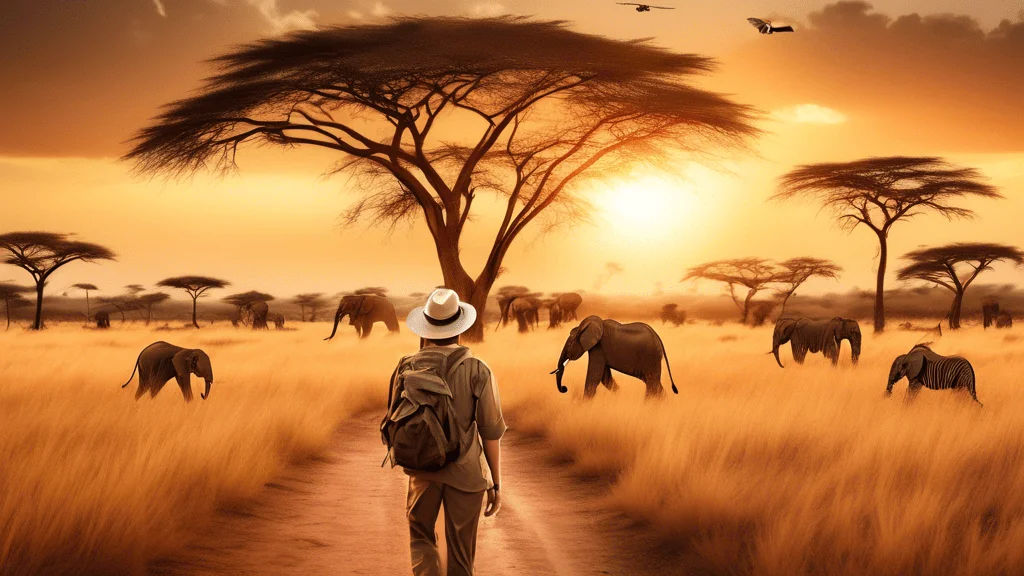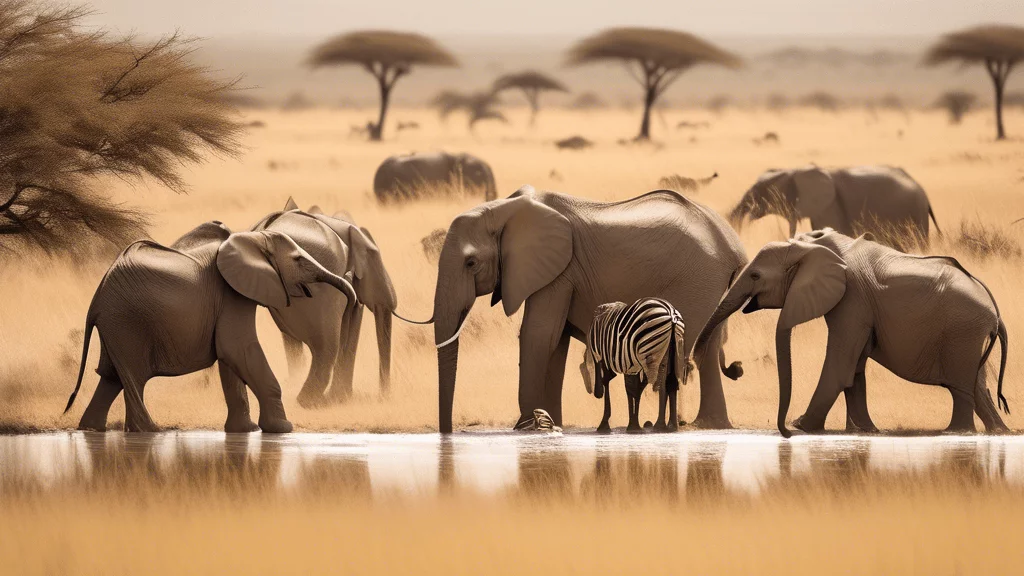kenya Kenyan Safari Etiquette: Do’s and Don’ts
Introduction to kenya Kenyan Safaris
Picture this: endless golden savannas, the distant call of a lion, and the graceful silhouette of a giraffe against the setting sun. This is the allure of a kenya Kenyan safari—a journey that promises not just breathtaking landscapes but also a profound connection with the wild. But as much as it’s a ticket to nature’s grand theater, a kenya Kenyan safari also demands a bit of homework. Why, you ask? It’s crucial to respect local customs and wildlife to make the most of this once-in-a-lifetime experience. In this article, we’ll explore the do’s and don’ts of kenya Kenyan safari etiquette, so you can tread lightly and leave only footprints behind.
Do’s for a Memorable kenya Kenyan Safari
Let’s start with the ‘do’s’—simple but essential practices that ensure you not only have a fantastic time but also safeguard the environment and respect the locals.
Dress Appropriately
First off, dress for success—or at least for safari success. Leave the flashy colors and heels at home. Opt for neutral tones that blend with the environment and sturdy, comfortable footwear. Trust me, your feet will thank you!
Follow Park Rules
Stick to the park rules like a loyal friend. These guidelines aren’t just arbitrary; they’re designed to keep both you and the wildlife safe. Ever heard of someone regretting following the rules? Me neither.
Respect Wildlife
Always remember, you’re a visitor in the animals’ home. Keep a safe distance and avoid disturbing them. No one likes an uninvited guest getting too close for comfort, right?
Be Polite and Courteous
Manners maketh man—or in this case, a well-behaved tourist. Show respect to your guides, locals, and fellow adventurers. It’s amazing what a smile and a little politeness can achieve in this world.
Sustainable Practices
Eco-friendly is the way to be. From minimizing plastic use to keeping your waste in check, little actions add up. After all, wouldn’t you want future generations to experience the same awe-inspiring landscapes?
Don’ts to Avoid to Ensure a Respectful Safari Experience
Now, let’s dive into the ‘don’ts’—those avoidable pitfalls that can tarnish an otherwise perfect safari.
Avoid Loud Noises
Lower your voice and keep it down. Loud noises can scare away the very wildlife you came to see. Silence, as they say, is golden.
Don’t Litter
Keep trash where it belongs—inside a bin. Littering not only ruins the beauty but can also harm animals. Easy enough, right?
Do Not Feed the Animals
Resist the temptation to share your snacks. Feeding wildlife disrupts their natural behavior and can lead to dangerous situations. Nobody wants an overly friendly lion!
Refrain from Unnecessary Flash Photography
That perfect shot can wait. Unwarranted flashes can startle animals and spoil their habitat. Use that camera considerately.
Avoid Straying from Designated Paths
Stick to the paths like a pro. Going off-trail can be dangerous for you and damaging to the ecosystem. Safety first, always.
Cultural Sensitivities and Respect for Local Communities
Your safari is not just about the wildlife; it’s also about the people. Treat local traditions and norms with respect, and you’ll earn respect in return.
Photo Etiquette with Locals
Before you snap that photo of a local person, ask for their permission. Respect is a two-way street, and this little gesture goes a long way.
Supporting Local Economy
Where possible, buy local. Whether it’s handicrafts or services, your contribution helps sustain the local economy and culture.
Conclusion and Final Tips
To wrap it up, a memorable kenya Kenyan safari is all about respect and responsibility. Follow these do’s and don’ts, and you’re well on your way to an incredible adventure that’s respectful of wildlife, the environment, and local communities. So pack those binoculars and get ready to be swept off your feet—kenya Kenya awaits!
Introduction to kenya Kenyan Safaris
Imagine the sun rising over the vast savannas, the air filled with the distant calls of exotic birds, and the sight of majestic elephants wandering through the grasslands. Welcome to the allure of kenya Kenyan safaris! It’s a dream come true for many, an opportunity to connect with nature in its rawest, most unfiltered form. But as enchanting as it may seem, there’s more to enjoying a kenya Kenyan safari than just hopping onto a jeep and snapping photos.
Overview of the Allure of kenya Kenyan Safaris
kenya Kenya is renowned for its breathtaking landscapes, diverse wildlife, and cultural richness. From the Great Migration in the Maasai Mara to the pink-hued flocks of flamingos in Lake Nakuru, there’s something almost magical about witnessing life in the wild here. Safaris offer an unparalleled opportunity to see animals in their natural habitats, observe their behaviors up close, and truly marvel at the wonders of nature.
Importance of Understanding and Respecting Local Customs and Wildlife
However, with such an extraordinary experience comes a responsibility. Understanding and respecting local customs and the wildlife you’re there to see is crucial. Imagine if you were in your hometown and someone just barged in, ignored all the local politeness and traditions, and even disturbed your routine. Not cool, right? Similarly, our mere presence can have a significant impact on the areas and communities we’re visiting. It’s not just about enjoying the moment but also ensuring that others—both people and animals—can continue to enjoy these wonders.
Brief Mention of the Article’s Focus on Etiquette
In this article, we’re diving deep into kenya Kenyan safari etiquette. We’ll cover what to do, what not to do, and some key cultural sensitivities you should be aware of. After all, a safari is not just about the destination but also about the journey and the mindful interactions along the way. Ready? Let’s go on this adventure together!
Do’s for a Memorable kenya Kenyan Safari
Dress Appropriately: Tips on Suitable Clothing and Gear
Alright, let’s talk wardrobe because, trust me, nothing spells rookie like showing up in the wrong outfit. Picture this: you’re out for a game drive in a neon tracksuit. Not only are you going to roast under the African sun, but you’ll also probably scare away more animals than you’ll see. So, what should you wear? Stick to neutral-colored, lightweight clothing – think khakis, olive greens, and browns. These colors blend with the environment, helping you stay cool and less noticeable to wildlife. And don’t forget a good hat, sunglasses, and loads of sunscreen. The sun can be particularly unforgiving out there.
Follow Park Rules: Importance of Adhering to Park Regulations and Guidelines
If there’s one thing you take away from this, let it be this: park rules are non-negotiable. Seriously, don’t be that person who thinks regulations are mere suggestions. These rules exist to protect you, the wildlife, and the environment. For example, most parks have speed limits for vehicles – usually around 25 mph. This isn’t just to make sure you drive safely but also to ensure you don’t disturb the animals. Think of it this way: you wouldn’t go racing through someone else’s home, right? So, respect the animals’ turf.
Respect Wildlife: Guidelines on Keeping a Safe Distance and Avoiding Disturbances
I get it. You want that perfect close-up of a lion. But here’s the thing – going too close is not only dangerous but also disrespectful. Remember, you’re a guest in their home. Always keep a safe distance. Most parks recommend at least 20 meters for big game. Trust your guide on this; they know the right balance between a great view and safe observation. Pro-tip: patience pays off. Sometimes staying still and quiet can lead to incredible, natural wildlife interactions.
Be Polite and Courteous: Emphasizing Respect Towards Guides, Locals, and Fellow Tourists
Manners go a long way, whether you’re interacting with your tour guide, chatting with locals, or meeting fellow tourists. Your guide, for instance, isn’t just a driver – they are experts with invaluable knowledge about the wildlife and the terrain. Listen to them, ask questions respectfully, and tip generously if service was exceptional. When it comes to locals, a simple “hello” in Swahili – “Jambo” – can make a world of difference. And let’s not forget fellow tourists. Share the best spots, help each other with photos, and basically, just be the kind of person you’d love to meet on vacation.
Sustainable Practices: Encouraging Eco-Friendly Behaviors and Practices
We all want to leave the world a better place, right? So let’s talk sustainability. Simple things can make a huge difference. For starters, carry a reusable water bottle. Many lodges have refill stations, so there’s no need to go through a mountain of plastic bottles. Stick to the designated roads and paths to minimize your impact on the ecosystem. And when nature calls, use proper restroom facilities. “Going bush” might feel adventurous, but it’s not great for hygiene or the environment.
By embracing these practices, you’re not just having a memorable safari; you’re also contributing to the protection and preservation of these incredible landscapes and the creatures that call them home. Now, isn’t that something worth doing?
Don’ts to Avoid to Ensure a Respectful Safari Experience
Avoid Loud Noises
Picture this: you’re out in the wild, the sun is setting, and the savanna is bathed in a golden hue. Suddenly, someone in your group decides to blast their favorite playlist. What happens to that serene moment? Gone, just like that. When you’re on a kenya Kenyan safari, it’s crucial to keep noise levels down. Wildlife is sensitive to sound, and loud noises can stress the animals, disrupt their behavior, and even cause them to flee. So, keep conversations low and avoid playing loud music or shouting. Trust me, the whispers of the wild are much more enchanting anyway.
Don’t Litter
Littering isn’t just an eyesore; it’s a danger to the environment and wildlife. Imagine if someone left a plastic bottle out in the middle of the Maasai Mara. That bottle could end up in the stomach of a curious elephant or be ingested by birds. Carry a small bag for your trash and dispose of it properly when you get back to your lodge or camp. The goal is to leave the park as pristine as you found it. Plus, no one wants their perfect safari shot ruined by litter in the background!
Do Not Feed the Animals
Feeding wildlife might seem like an innocent act—or even a kind one—but it has serious repercussions. Wild animals have specialized diets, and human food can make them sick. Moreover, animals fed by humans can become reliant on these handouts, losing their innate foraging skills. This makes them more vulnerable and can lead to harmful interactions with humans. Picture this: a majestic lion so accustomed to being fed, it approaches humans looking for food. Dangerous, right? Keep a safe distance and let animals find their own meals.
Refrain from Unnecessary Flash Photography
Photography is a fantastic way to capture memories of your safari adventure. However, flash photography can be disturbing and frightening for wildlife. No one likes to have bright lights flashed in their eyes, and animals are no different. Instead, use natural light or increase your camera’s ISO settings to get that perfect shot. Besides, your photos will look more natural and captivating without the harsh glare of a flash. So, click away, but with the welfare of the wildlife in mind.
Avoid Straying from Designated Paths
Stick to the beaten path, literally. Venturing off designated trails might seem like a great way to explore, but it poses several risks. For starters, it can damage the fragile ecosystem. Plants, insects, and small animals rely on these untouched areas for survival. Additionally, going off-trail can be dangerous. kenya Kenya’s wildlife includes predators and other potentially dangerous animals that use these secluded areas. Plus, it’s easy to get lost or face unexpected hazards. So, play it safe and stick to the paths set by your guides—they’re there for a reason.
By keeping these don’ts in mind, you’ll not only ensure a safe and respectful experience for yourself but also contribute to the preservation of kenya Kenya’s remarkable wildlife and natural beauty. Isn’t that worth a little extra effort?
Cultural Sensitivities and Respect for Local Communities
Understanding Local Traditions and Norms
Embarking on a kenya Kenyan safari isn’t just about getting up close with magnificent wildlife; it’s also an opportunity to immerse yourself in the rich and diverse local culture. But let’s be honest, navigating cultural norms can sometimes feel like tiptoeing through a minefield. It’s crucial to approach this with sensitivity and a genuine interest in learning. For instance, did you know it’s considered respectful to greet someone with a handshake, even in the most remote villages? But, here’s a tip: handshakes often last longer than what you might be used to, so don’t be in a rush to pull away!
When visiting local tribes, like the Maasai, it’s essential to show respect for their way of life. How do you do that? Start by dressing modestly—ladies, leave those short shorts back at the lodge. And remember, it’s more about listening than talking. Showing genuine interest can go a long way. Ask open-ended questions and be mindful of local customs, such as not pointing with your finger, which is considered rude. Instead, use your entire hand when gesturing.
Photo Etiquette with Locals
Now, who doesn’t want to capture every moment of their incredible journey? But there’s a golden rule when it comes to photographing locals: always ask for permission. Imagine if a stranger started snapping photos of you without asking—awkward, right? The same principle applies here.
When I visited kenya Kenya, I was enamored by the vibrant attire of the Maasai warriors. The temptation to whip out my camera was strong. But, I made it a point to engage first, ask politely if I could take a photo, and respect their response, whether it was a yes or no. A simple, “Jambo! (Hello) May I take your photo?” in a friendly tone usually does the trick. And don’t forget, if someone asks for a small tip in exchange, it’s generally considered polite to oblige—just make sure it’s a reasonable amount.
Supporting Local Economy
One of the most meaningful ways to show respect and appreciation for local communities is by contributing to their economy. It’s not just about spending money; it’s about making conscious choices that benefit the locals. Whether it’s purchasing handmade jewelry, textiles, or other crafts, every little bit helps. Plus, these make for unique souvenirs that carry a story.
During my trip, I visited a local market and picked up some beautifully crafted beadwork. What’s more, buying directly from artisans ensures they get a fair price for their labor, unlike if you were to purchase similar items in a far-off tourist shop. So, next time you’re contemplating whether to buy that exquisite carved wooden mask, remember, you’re not just purchasing a piece of art—you’re supporting a local tradition and helping sustain the community.
In addition, consider using local guides and staying in lodges or camps that employ local staff. This simple practice ensures that your tourist dollars are helping to create jobs and improve the living standards of those in the area. Plus, who better to show you around than someone who knows the land like the back of their hand?
In summary, respecting cultural sensitivities while on a kenya Kenyan safari isn’t difficult. It just requires a bit of forethought and a willingness to adapt. By understanding and embracing local traditions, asking before photographing, and supporting the local economy, you’ll not only enrich your own experience but also leave a positive impact on the communities you visit. So, the next time you find yourself in the stunning savannahs of kenya Kenya, remember these small gestures can make a big difference. And who knows? You might just find yourself making friends for life.
Conclusion and Final Tips
Recap of Major Do’s and Don’ts
As we wrap up, let’s quickly revisit the major do’s and don’ts of enjoying a kenya Kenyan safari. Remember to dress appropriately – think lightweight, neutral-colored clothing and comfy hiking boots. Don’t forget a hat and sunscreen! Follow park rules diligently; they’re in place to keep you, the wildlife, and the environment safe. Respect the majestic animals you’ve come to see by keeping a safe distance and not disturbing them. Politeness never goes out of style, whether you’re dealing with your guide, locals, or fellow tourists. And, of course, embrace sustainable practices like using reusable water bottles and bags.
On the flip side, keep the volume down; it’s amazing how peaceful the savannah is when you listen. Littering is a big no-no – your snack wrappers can do more harm than you think. Feeding the animals might seem fun, but it messes with their natural habits and can be dangerous. Flash photography might get you that perfect shot, but it can distress the animals. Finally, stay on designated paths to ensure your safety and preserve the natural beauty of the park.
Emphasizing the Importance of Respect and Responsibility
Why all these rules and guidelines? They boil down to one critical value: respect. Respect for the land, the wildlife, and the people who call this incredible place home. On a safari, you’re a guest in someone else’s home, and being respectful not only enriches your experience but also ensures that these wonders will be around for future generations. Remember the time your cousin Dave stayed over and left a mess in your living room? Exactly.
Taking personal responsibility is key too. Sometimes, it’s easy to think that one piece of litter won’t make a difference or that one noise won’t disrupt the wildlife. In reality, every little action adds up. Being conscientious about your actions while on safari shows that you’re not just another tourist passing by, but an informed visitor who cares about your incredible surroundings.
Encouragement to Enjoy the Experience
Now, let’s focus on what’s most important: experiencing the magic of a kenya Kenyan safari. Whether you’re going for the first time or it’s your tenth trip, the thrill of spotting a lion lounging under an acacia tree or witnessing the grandeur of the Great Migration never gets old. By following these etiquette tips, you’ll ensure that your safari is memorable for all the right reasons.
So, pack your bags, bring along your sense of adventure, and go embrace the wild heart of kenya Kenya with respect and responsibility. You’ll come back not just with beautiful photos, but with memorable stories and a genuine appreciation for one of the world’s most stunning travel destinations.
“`html
Conclusion and Final Tips
Alright, let’s wrap things up with a quick recap of the major do’s and don’ts for your kenya Kenyan safari adventure. To begin with, make sure you dress appropriately—not just for your comfort, but out of respect for local customs and the delicate balance of the ecosystem. Stick to the park rules, and always remember that you’re a visitor in the wild. Respecting wildlife means keeping a safe distance and avoiding any actions that might disturb these magnificent creatures.
When it comes to interacting with people—be they your guides, other tourists, or local communities—politeness and courtesy go a long way. Sustainable practices, like reducing waste and conserving resources, will help ensure these incredible natural reserves are preserved for future generations.
On the flip side, avoid loud noises which can stress animals and disturb the natural serenity, don’t litter (a no-brainer, right?), and definitely don’t feed the wildlife. Trust me, a selfie with a monkey may seem like a fun idea, but the repercussions aren’t worth it. Be mindful of your photography choices—no one wants to blind a lion with flash photography. Lastly, stick to designated paths to avoid accidents and protect the natural habitat.
And let’s not forget your interactions with local communities. Basic etiquette, like understanding and respecting local traditions, seeking permission before snapping photos, and supporting the local economy by purchasing local goods, goes a long way in fostering positive relationships and contributing to the region’s sustainability.
At the heart of all these guidelines is a simple principle: respect. Respect for the land, the wildlife, and the people. Adhering to these practices not only enriches your personal experience but also helps preserve the magic of kenya Kenyan safaris for others.
So, go ahead! Embark on your safari adventure with confidence, armed with the knowledge to make it an enriching, respectful, and unforgettable experience. Happy exploring!










